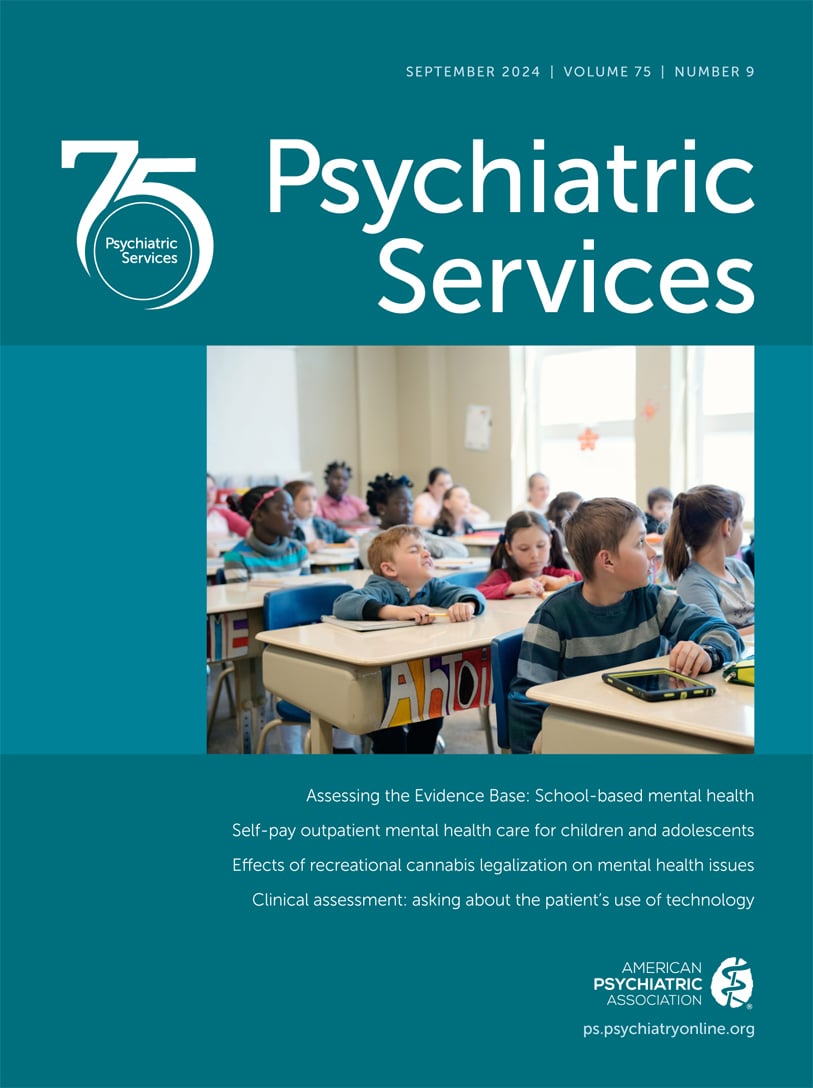Psychiatric Services
- Volume 51
- Number 3
- March 2000
Taking Issue
Department
Column
Department
Column
Publication date: 01 March 2000
Pages313–317Introduction by the column editors: Psychiatric rehabilitation begins during the acute stages of a psychiatric disorder and continues throughout the person's lifetime, with the types of services flexibly keyed to the person's phase of illness, needs, and ...
https://doi.org/10.1176/appi.ps.51.3.313Historical Article
Publication date: 01 March 2000
Pages327–331Editor's Note: The article on the new drugs reprinted below appeared in the February 1956 issue of Mental Hospitals. It is based on a discussion held during the Seventh Mental Hospital Institute in October 1955 in Washington, D.C. Chlorpromazine and ...
https://doi.org/10.1176/appi.ps.51.3.327Publication date: 01 March 2000
Page332Editor's Note: The essay below, published in the Dr. Whatsisname column in the June 1959 issue of Mental Hospitals, takes a wry look at the wholesale discharge of patients from mental hospitals following the introduction of the new drugs. (See "The New ...
https://doi.org/10.1176/appi.ps.51.3.332Publication date: 01 March 2000
Pages333–335Editor's Note: In the commentary below, Robert Cancro, M.D., discusses the article on page 327, reprinted from the February 1956 issue of Mental Hospitals, describing how hospitals were dealing with clinical and administrative issues surrounding the use ...
https://doi.org/10.1176/appi.ps.51.3.333Other Article
Publication date: 01 March 2000
Pages336–340OBJECTIVE: Practice variations in the diagnosis, treatment, and outcomes of patients with major depression were examined within six psychiatric practices participating in a national outcomes-management project. METHODS: Six of 20 psychiatric clinics met ...
https://doi.org/10.1176/appi.ps.51.3.336Publication date: 01 March 2000
Pages341–348OBJECTIVE: The reliability, validity, and feasibility of the routine use of a generic health status instrument, the Short-Form-36 Health Survey (SF-36), were examined in a psychiatric outpatient clinic of a general hospital. METHODS: The sample comprised ...
https://doi.org/10.1176/appi.ps.51.3.341Publication date: 01 March 2000
Pages349–353OBJECTIVE: The study sought to determine whether psychiatric inpatients who completed a self-report symptom and problem rating scale on admission and reviewed the results with a clinician would perceive at discharge that they had been more involved in ...
https://doi.org/10.1176/appi.ps.51.3.349Publication date: 01 March 2000
Pages354–358OBJECTIVE: The study examined patterns of care for persons with mental illness in nursing homes in the United States from 1985 to 1995. During that period resident populations in public mental hospitals declined, and legislation aimed at diverting ...
https://doi.org/10.1176/appi.ps.51.3.354Publication date: 01 March 2000
Pages359–363The authors identify the clinical and ethical implications of impaired executive control functions for patient autonomy. Executive control functions are processes that orchestrate relatively simple ideas, movements, or actions into complex goal-directed ...
https://doi.org/10.1176/appi.ps.51.3.359Publication date: 01 March 2000
Pages364–368OBJECTIVE: The relationship between caseload size and self-perceived clinical effectiveness of mental health case managers was explored. METHODS: A 17-item instrument developed for the study, the Case Manager Personal Efficacy Scale (CMPES), was completed ...
https://doi.org/10.1176/appi.ps.51.3.364Publication date: 01 March 2000
Pages369–374OBJECTIVE: The study examined the effectiveness of an outreach intervention designed to increase access to mental health treatment among veterans disabled by chronic posttraumatic stress disorder (PTSD) and identified patient-reported barriers to care ...
https://doi.org/10.1176/appi.ps.51.3.369Publication date: 01 March 2000
Pages375–379OBJECTIVE: The effectiveness of family interventions may be improved by concentrating on elements of objective burden that best predict subjective burden. The relationship between subjective burden and objective burden was investigated among caregivers of ...
https://doi.org/10.1176/appi.ps.51.3.375Brief Report
Publication date: 01 March 2000
Pages380–382In a sample of 104 medically stable male veterans with alcohol dependence, rates of health service utilization were compared for 48 patients with a primary diagnosis of antisocial personality disorder and 56 patients without this diagnosis. Patients were ...
https://doi.org/10.1176/appi.ps.51.3.380Publication date: 01 March 2000
Pages383–385Rapid deinstitutionalization occurred in Finland in the 1990s, a decade later than in many other Western countries. A four-year follow-up study in northern Finland examined community placements of 253 long-stay psychiatric inpatients after ...
https://doi.org/10.1176/appi.ps.51.3.383Publication date: 01 March 2000
Pages386–388The effects of traumatic loss on children who reported a friend or acquaintance killed in the 1995 Oklahoma City bombing of a federal office building were examined. Twenty-seven children who lost a friend or acquaintance and 27 demographically matched ...
https://doi.org/10.1176/appi.ps.51.3.386Letter
Book Review
News & Notes
Past Issues
View Issues Archive
Vol. 75 | No. 12

Vol. 75 | No. 11

Vol. 75 | No. 10
